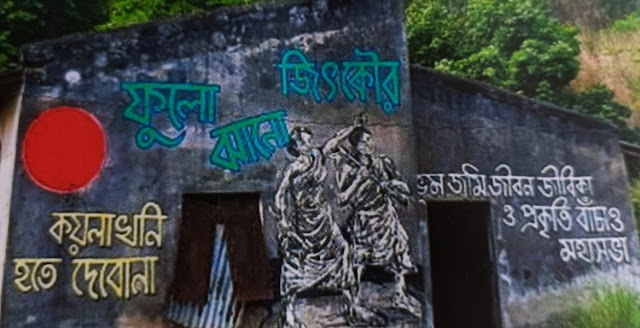The Deucha Pachami coal mine project in West Bengal's
Birbhum district is now making headlines because it is anticipated to be a key
election issue when the district votes on May 13, 2024. West Bengal Chief
Minister Mamata Banerjee has presented the Rs 20,000 crore project—which is
said to have the largest coal reserves in India—as a massive job and investment
development. This project is the second-largest coal mining project worldwide
and the largest in India.
The administration of Mamata Banerjee is looking to buy land for the mining
project because they promised the public that it would provide over one lakh
new job opportunities. In addition, the project is expected to have a major
positive economic impact on the state by providing cheap electricity to the
state over the next 100 years. A compensation package valued at Rs 10,000 crore
has been set aside for project affected parties. On behalf of the state
government, 203 landowners received employment letters, leases, and
compensation checks. On the other hand, the opposition alleges that the
Mamata government is using this initiative for political gain ahead of the
upcoming elections.
Mamata Banerjee’s game-changing coal mining project might play a crucial role in shaping public perception during the upcoming elections. Obviously, highlighting such initiatives during election campaigns resonates with voters. However, despite all this political agitation and tempting promises, some matters still remain important, which cannot be ignored, including:
What could be the major environmental effects from this project?,
The Deucha Pachami Dewanganj Harinshinga coal mine project involves a two-phase, 79-hole exploratory drilling process carried out by the Central Mine and Planning Design Institute (CMPDI). This is a crucial step in preparing the mine development plan. Upon completion, CMPDI, a subsidiary of Coal India Limited, is expected to submit a detailed geological report in the next 16-18 months.
Environmental activists have also voiced their worries about greenhouse gas emissions from power plants that use low-quality coal and open-pit mining, which are contributing to pollution in the area. These include the fallout from open-pit mining, the uprooting and job-rehabilitation of impacted individuals, the inadequate planning for the transportation of coal, the opaqueness of land acquisition, the lack of policies protecting forest resources, issues with noise and soil pollution, air and water pollution, and the covert handling of mining waste. In its efforts to facilitate operations, the administration appears to have missed some very important details.
The issue doesn't end here, there are worries that the Forest Rights Act of
India, which aims to protect the rights of local communities living next to
forests, might be weakened in order to benefit business interests. There are
claims that the Forest Rights Act's regulations are not being followed when
taking over tribal lands for the Deucha Pachami coal mine.
In a letter sent to Mamta Banerjee in February 2022, green groups and environmentalists raised serious concerns regarding the project's potential effects on the environment. However, the administration has not responded in the last two years. Nonetheless, the announcement of the compensation package and the commencement of the land acquisition process have been made.
It is still unclear how much forest space and trees will need to be cut down
for the project, as well as how the area's surface and groundwater supplies
would fare and whether or not the project will have an effect on neighboring
rivers and these water sources.
In fact, scientists, technicians and teachers in West Bengal are also strongly opposing this initiative. They expressed their concerns at a public conference held in Kolkata recently. The strangest thing is that the Communist Party of India (Marxist) has criticized TMC, but the main opposition party 'Bharatiya Janata Party' has not said anything on this matter.
As per experts, the Deocha-Pachami coal block is indeed unique because the upper layer of soil contains not only coal but also valuable minor minerals. Regulation of mines and minerals is a state subject according to the Constitution of India unless any particular case is placed under the control of the central government through laws enacted by the Parliament in view of larger public interest. Thus, while the allocation of the Deocha-Pachami coal block is in the hands of the central government (perhaps this is the reason why the BJP government is silent on this issue), whereas the control over black stones in the region lies in the hands of the West Bengal government.
How can nearby communities be affected by this project?,
These possible effects highlight how crucial it is to execute such large-scale projects with meticulous planning and strict adherence to environmental standards.
Once finished, this project is predicted to become Asia's largest coal mine in addition to India. An estimated 12.28 square kilometers make up the Deucha Pachami Dewanganj Harinshinga block, and a Geological Survey of India assessment states that the block contains a coal deposit of 1198.31 million tonnes. The coal is thought to be beyond Coal India's technological reach because it is situated between 135 and 850 meters below the surface.
The Deucha Pachami coal mine project is in fact connected to the Dewanganj Harinshinga block, which is significant to mention here. The Birbhum coalfield contains the adjacent coal blocks of Deucha Pachami and Dewanganj Harinshinga. They reside in the same coalfield region. The Dewanganj-Harinsingha and Deocha-Pachami sections of the proposed coal mine span 12.31 square kilometers, or 3,400 acres. The Dewanganj-Harinsingha coal block is allegedly where the government intends to begin mining. The Deucha Pachami Dewanganj Harinshinga coal mines, with an estimated resource of 2.1 billion tonnes, are the second largest coal block in the world. West Bengal Power Development Corporation Ltd (WBPDCL), a state PSU, is the owner of them and they are situated in the Birbhum area.


.png)








0 Comments